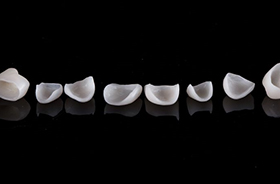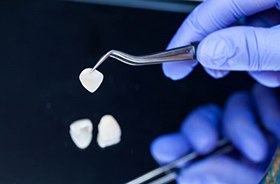
Dental Crowns – Branford, CT
Restore the Form and Function
of Damaged Teeth

Do you have a cavity that constantly causes you discomfort? How about a chipped or cracked tooth that creates dull but persistent pain? If so, a dental crown may be able to make these problems a thing of the past. Crowns are custom-made restorations that we use to repair and strengthen damaged teeth. Thanks to our team’s advanced skills and artistic eye, you can trust that the end result will be both strong and natural-looking. If you are in need of a dental crown in Branford, give New Haven Dental Group a call today.
Why Choose New Haven Dental Group
for Dental Crowns?
- Custom-designed for each patient
- 100% porcelain restorations available
- Designed to look amazing and stand the test of time
What Are Dental Crowns?

A dental crown gets its name from the fact that it sits on top of a natural tooth, covering the entire portion that is visible above the gum line. A crown fulfills two important roles: It protects any fragile or weakened enamel, and it restores a tooth’s original shape and appearance. Crowns help us save damaged teeth from extraction, which is a more conservative approach that brings long-term oral health benefits to patients.
How We Use Dental Crowns

With a dental crown, we can:
- Repair a cavity that is too large for a filling
- Hold a tooth together that has experienced physical trauma
- Prevent a cracked tooth from suffering further damage
- Protect a tooth following root canal therapy
- Improve the appearance of an aesthetically imperfect tooth
- Correct an imbalanced bite to relieve TMJ pain and/or headaches
- Replace a missing tooth (when paired with a dental implant)
Crowns can be made from a variety of materials, including gold, silver, porcelain, and more. The material we choose for each patient is based on where a tooth is located in the mouth as well as the patient’s unique circumstances. Generally, a back tooth must be as durable as possible, so may recommend a metal crown, while a front tooth needs to be strong and aesthetically pleasing, in which case we will recommend an all-porcelain crown.
What Happens During the Procedure?

The procedure to get a crown involves three basic stages that will take place over the course of two appointments:
- First, your dentist examines your tooth and may recommend a crown as a treatment option. If you agree, you proceed to the next two steps.
- Your tooth will need to be reshaped slightly in order to fit beneath the crown. After numbing you, your dentist will gently remove any damaged or decayed enamel and shape the tooth as necessary. Once this is complete, they will take impressions and images of your tooth and send them to a dental lab, which will create your crown. Before you leave this first appointment, your dentist will protect the tooth with a temporary restoration.
- Roughly one week later, you will return to our dental office to have your temporary restoration removed and your final crown attached to your tooth. After your dentist checks the fit and your bite one last time, the procedure is complete.
What to Expect with Dental Crowns

Immediately following the procedure, your tooth might feel extra sensitive for a few days, but this should subside naturally. To take care of your crown, all you need to do is treat it like a natural tooth; you should brush, floss, attend regular checkups, and avoid any risky habits that might damage your teeth. If you care well for your crown, it should last for about 15 – 20 years.
Understanding the Cost of Dental Crowns

The cost of dental crowns depends on a few different factors. When you visit us for your restorative consultation, we will be able to discuss specific numbers. Our team will also walk you through your payment options. We welcome insurance, and you may be eligible for low-interest financing.
Factors that Affect the Cost of Dental Crowns

Some factors that may have an influence on the cost of dental crowns include:
- Preparatory treatment. If you need root canal therapy or other treatments prior to receiving your crown, it can add significantly to the total cost of your care.
- Crowns can be constructed out of various materials, including different types of metals, porcelain, zirconia, porcelain fused to metal, and more. Each type of crown comes with its own price, as well as its own pros and cons.
- The crown-making process. Laboratory fees and other expenses will be incorporated into the final cost of your crown.
If you ever come across a “bargain” for crowns that seems too good to be true, it probably is! Quality is very important for what goes in your mouth. It is best to invest in high-quality care right from the beginning so you can avoid the discomfort and disappointment that you might otherwise have to deal with.
Does Dental Insurance Cover Dental Crowns?

In most cases, yes, dental insurance covers dental crowns. The treatment is usually classified as a major procedure, so around 50% of its cost may be covered, up to the amount of your annual maximum. However, if your crown is purely for cosmetic purposes, it may not be covered. Our team is experienced at handling insurance claims. We will walk you through the process of using your benefits and file all necessary paperwork on your behalf.
Other Options for Making Dental Crowns Affordable

Beyond insurance, there are a couple of provisions that you may be able to use to make your crown more affordable:
- The Essential Dental Plan. In exchange for a reasonable fee, this discount plan provides reduced prices on almost all of the services available in our practice, including restorative crowns.
- We work with CareCredit, a third-party lender that offers low-interest payment plans for dental services. The application process is fast and easy, and most patients are quickly approved for credit.
Are you ready to learn more about dental crowns and their cost? Our team would be happy to answer your questions. Get in touch with us today to book your appointment.
Dental Crowns FAQs

Our Branford dental team is eager to help you enjoy a healthy smile, so we are ready to provide high-quality dental crowns. Before you attend your restorative consultation, though, it is understandable if you would like to know more about the process in front of you. Of course, you are free to call us to ask questions. In the meantime, you can gain valuable information by reading the following list of FAQs:
What Are Dental Crowns Made Of?
Dental crowns can be constructed out of a few different materials:
- Temporary crowns are usually constructed out of stainless steel because it is cost-effective.
- Metal crowns, such as those made out of gold, silver, nickel, and palladium, are extremely durable. We sometimes recommend them for molars because they hold up well under the pressures of chewing.
- Porcelain-fused-to-metal (PFM) crowns have a metal inner shell and a porcelain exterior. The porcelain looks incredibly natural.
- All-porcelain crowns look almost identical to natural teeth, so we often use them to restore teeth toward the front of a patient’s mouth.
Are Dental Crowns Permanent?
Dental crowns require a permanent commitment because during the treatment process, we have to significantly modify a tooth by removing some of its enamel. That enamel will not grow back on its own, so the tooth will always need a crown to protect it.
However, that does not mean you should expect your crown to last forever. Usually, they endure for 5 – 15 years before replacement becomes necessary. You may be able to extend your crown’s life by sticking to a good oral hygiene routine, visiting us regularly for checkups, and taking other reasonable steps.
How Do You Know When a Dental Crown Needs to Be Replaced?
Here are some indications that your crown might need to be replaced:
- The tooth beneath the crown is in pain.
- The crown has visible signs of damage or wear. For example, a PFM crown might develop a dark line at its base.
- The crown is unstable, or you are having difficulty chewing with it.
When you visit us, we will examine the crown and let you know for sure whether it needs to be replaced.
Do Dental Crowns Get Cavities?
It is technically impossible for crowns to get cavities because they are not vulnerable to damage from plaque and tartar like natural tooth enamel.
However, the tooth beneath a crown may still develop cavities. Bacteria can sneak beneath the restoration and attack the underlying dentition, leading to decay. The best way to prevent this issue is by maintaining excellent oral hygiene. You should be especially diligent about cleaning along your gumline.